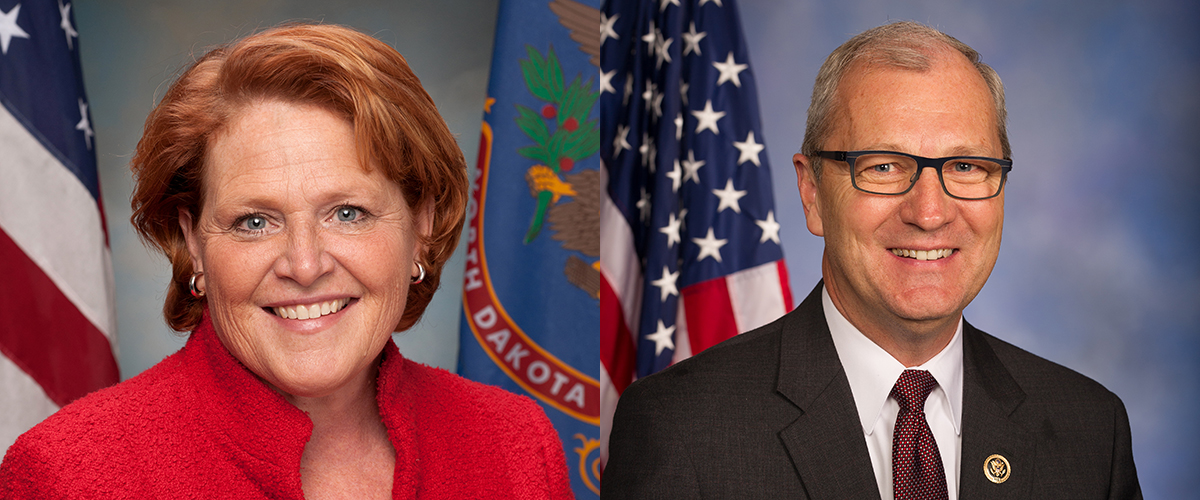Neither candidate is an aggressive supporter of cannabis, but they both have shown support for the rights of states to make their own cannabis policies.
Perhaps the most closely watched election in the upcoming November midterms is the race for United States Senate in North Dakota. Incumbent Sen. Heidi Heitkamp is fighting a tough reelection race against Rep. Kevin Cramer, who vacated his seat in the U.S. House in hopes of securing one in the Senate.
With officials suggesting that the next legislative session will take up federal cannabis policy reform, the next senator of North Dakota is likely to vote on important legislation related to the future of marijuana legalization.
North Dakota voters will also decide whether to legalize recreational marijuana. On their ballots will be the North Dakota Legalization and Automatic Expungement Initiative, a measure that legalizes adult use marijuana and creates an automatic expungement process for individuals with marijuana convictions.
Heitkamp and Cramer, while holding similar views on marijuana legalization, have voted differently on cannabis bills since they’ve been in office. Here’s a look at how each has responded to the cannabis issue.
Heidi Heitkamp (D)
- Recreational Marijuana Legalization: Has not shared her personal beliefs on adult use marijuana legalization, but supports states having the right to make their own cannabis policies
- Medical Marijuana Legalization: Has not shared her personal stance on legalizing medical marijuana, but supports protecting state-legal operations
Considered among the most moderate of Democrats in the U.S. Senate, Heitkamp has been relatively inactive on cannabis legalization efforts. North Dakota’s junior senator has not voted on any major pieces of federal marijuana legislation.
And yet, Heitkamp has come to the defense of states that have passed their own marijuana legalization laws. While marijuana is illegal federally, nine states have legalized recreational marijuana, and 30 – including North Dakota – have legalized medical marijuana.
After U.S. Attorney General Jeff Sessions earlier this year rescinded federal policy that had allowed states to set their own marijuana policies with fear of federal interference, Heitkamp joined a bipartisan effort to push the U.S. Senate Appropriations Committee to continue respecting state-legal marijuana operations.
“The DOJ decision to rescind years of legal guidance on marijuana could be very disruptive to states like North Dakota, whose residents decided to approve medical marijuana,” Heitkamp said.
“State laws on the issue should be preserved and respected. North Dakota should have the right to enforce its own laws on the matter, and I’m working to ensure Congress and the administration respect the will of residents in our state,” she added.
North Dakotans voted overwhelmingly in favor of medical marijuana—the federal government shouldn’t be getting in the way. https://t.co/LkT028p07P
— Heidi Heitkamp (@HeidiHeitkamp) February 20, 2018
Heitkamp also signed on as a co-sponsor of the SAFE Banking Act, which would allow banks to provide financial services to marijuana-related businesses without fear of federal penalty.
Heitkamp has not said where she stands on North Dakota’s measure to legalize recreational marijuana.
When asked directly by Politico about whether she would support the ballot initiative, her Senate office said, “Senator Heitkamp believes that these types of decisions are best left to the states and their citizens—and once made, that state laws should be protected.”
The National Organization for the Reform of Marijuana (NORML) has given Heitkamp a D grade on its congressional report card.

Kevin Cramer (R)
- Recreational Marijuana Legalization: Personally against it, and while he claims to support states’ rights to make their own policies, he has voted against such legislation
- Medical Marijuana Legalization: Has said he believes it should be left up to states
Since being elected to the U.S. House in 2012, Cramer has voted against nearly every proposal related to expanding or protecting access to cannabis.
While he voted in favor of the Rohrabacher-Farr amendment to protect state-legal medical marijuana operations in 2015, that same year he voted against the McClintock-Polis Amendment, a bill that prevents the Drug Enforcement Administration (DEA) from prosecuting anyone for using, selling, or possessing marijuana in compliance with state laws.
In 2014, he voted against preventing states from penalizing banks for servicing legitimate cannabis businesses. He has also twice voted against a bill that would expand medical cannabis access to veterans.
At the same time, Cramer has verbally called for the protection of the legal marijuana industry across the country.
After Sessions rolled back the policies that had paved the way for cannabis legalization in many states, Cramer said, “If they want to legalize marijuana, if they want to legalize marijuana in increments, if they want to legalize it for medical use and not recreation use. Whatever states want to do, I think it should be up to states.”
In a comment that suggests Cramer supports federal cannabis policy reform, he said that the move by Sessions should force “the bigger issue, and that is Congress should act on this and make it clear that … this a states’ rights issue, that it should be up to states to determine whether they want to allow marijuana.”
Cramer did in 2015 sign on as a co-sponsor on the Hemp Farming Act, a bill that would remove hemp from the Controlled Substances Act and legalize its cultivation in the U.S.
In regards to North Dakota’s recreational marijuana ballot initiative, Cramer in August said he would personally vote against it, adding, “We don’t need any more mind-altering substances on the market.”
He then noted, however, that, “It should be on the ballot and the people should be able to vote for it.”
Cramer has been given a C grade from NORML.
Marijuana in the 2018 Midterms
You can learn even more about marijuana in the 2018 midterms, including where candidates running for office stand, through our Election 2018 page.
Stay up-to-date on the latest cannabis industry news through our news page.






